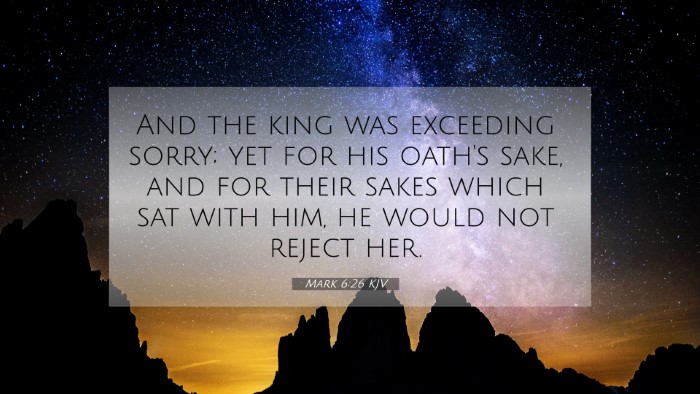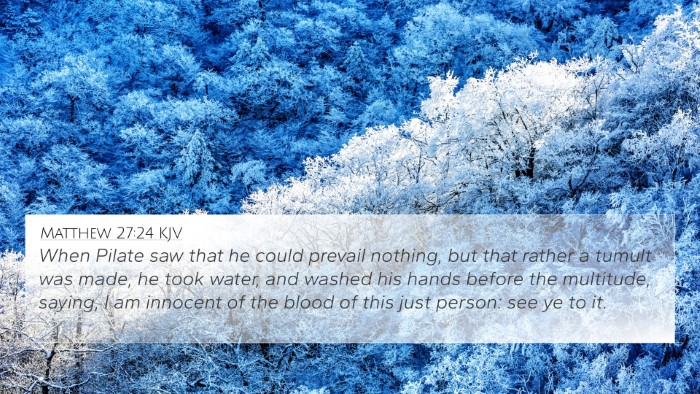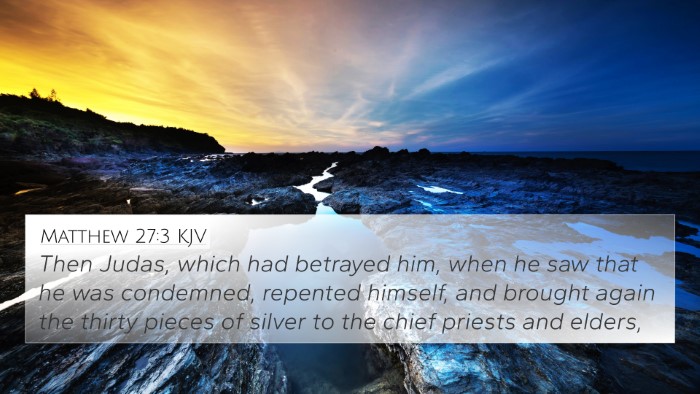Understanding Mark 6:26
Verse Context: Mark 6:26 states, "And the king was exceeding sorry; yet for his oath's sake, and for their sakes which sat with him, he would not reject her." This verse is situated in the narrative surrounding King Herod and the request of Herodias' daughter for the head of John the Baptist.
Meaning and Insights from Public Domain Commentaries
The verse captures a critical moment of moral conflict for King Herod. In his peer pressure and commitment to his oath, Herod reflects a profound struggle between personal integrity and public obligation.
Matthew Henry's Commentary
Matthew Henry notes that Herod's sorrow stems from his realization of the gravity of his decision. The king finds himself in a moral bind, caught between his desire to uphold his word (a matter of pride and credibility) and the horror of executing an innocent man. Henry emphasizes that this illustrates a common human struggle where one's promises and public image often tempt individuals to act against their moral convictions.
Albert Barnes' Commentary
Albert Barnes elaborates that Herodias' manipulation of Herod exposes the dark motivations behind her desire for John's death. She exploited Herod's reputation and public promises, leading to an outcome that sacrificed justice for the sake of appearances. Barnes underscores the lesson that one must be cautious about letting public commitments undermine ethical responsibilities.
Adam Clarke's Commentary
Adam Clarke highlights the tragic nature of Herod's situation, where his heart was conflicted. He had a sense of remorse but felt trapped by his own declarations. Clarke infers that this emotional turmoil signifies the consequences of rash promises and the lengths to which individuals might go to maintain their honor, even at the cost of righteousness.
Key Themes and Lessons
This verse serves as a stark reminder of the tension between integrity and obligation. The implications of pressure from those around us can lead to detrimental decisions and moral failures. Understanding this context can guide readers to an important lesson on the importance of discernment when making promises or commitments.
Bible Cross-References
- Matthew 14:6-10: Relates to the same event, providing further insight into Herod's decision-making.
- Luke 9:9: Shows Herod's curiosity about Jesus, illustrating his ongoing moral and spiritual conflict.
- 1 Timothy 6:10: "For the love of money is the root of all evil," which reflects the underlying motivations of Herod’s actions.
- James 5:12: Advises on the importance of not making oaths frivolously, which is directly connected to Herod's plight.
- Proverbs 20:25: Warns against making hasty vows, affirming that Herod’s decision stemmed from impulsivity.
- Galatians 1:10: Discusses the bondage of seeking approval from men over God, similar to Herod's fear of his peers.
- John 7:47-49: Illustrates the dangers of peer pressure, as seen in Herod's fear of losing face.
- Proverbs 29:25: "The fear of man brings a snare," encapsulating the predicament faced by Herod.
- Acts 12:1-2: References Herod Agrippa's own dilemma in executing James, paralleling the conflict of Herod in Mark.
- Luke 23:6-12: Further demonstrates the role of authority and the pressures that overcome one’s moral responsibility.
Conclusion
Mark 6:26 provides a profound reflection on the complexities of promise, integrity, and the influence of peer expectations. Insights from different scholars can enable an enriching study of this verse, and the provided cross-references offer valuable connections with other scriptures. Through comparative Bible verse analysis, readers can appreciate the interconnections within the biblical text, leading to a deeper understanding of God's Word.
Tools for Bible Study
Utilize resources such as a Bible concordance, Bible cross-reference guide, and cross-reference Bible study materials to further explore these themes and their biblical relationships. Understanding how to find cross-references in the Bible enriches one’s study, revealing how the scriptures dialog with each other.





